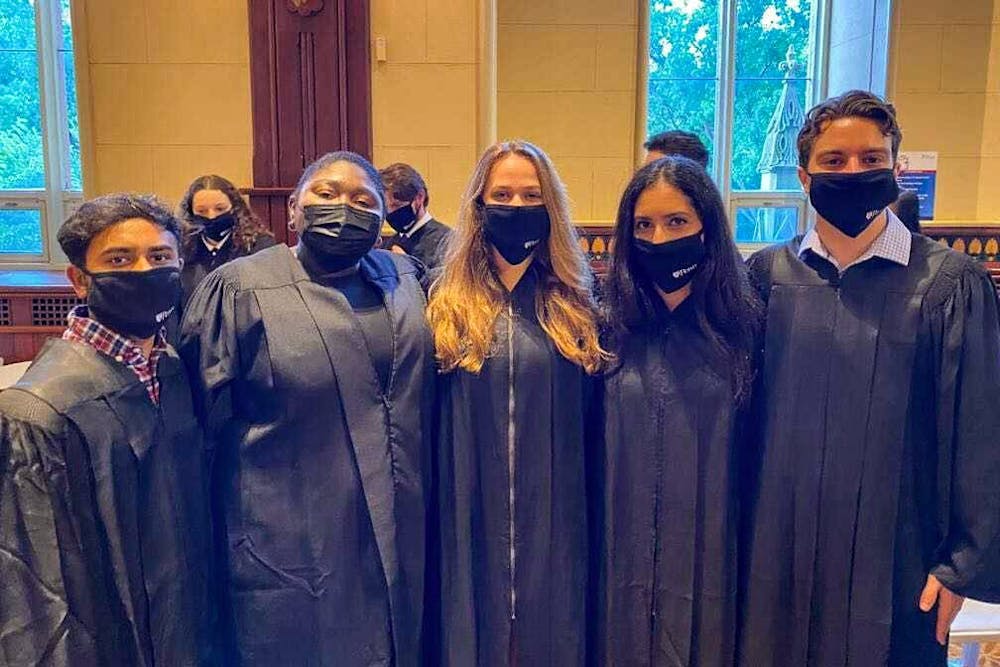
The Undergraduate Assembly elected its speaker, secretary, and treasurer to round out its executive board for the 2021-2022 academic year — and the team plans to advocate for creating avenues for student feedback and increasing student awareness about the work of the UA.
The UA internally elected College and Wharton junior Carson Sheumaker as speaker, College sophomore Pranav Tadikonda as secretary, and College junior Sarah Ramadan as treasurer. The students were elected on April 25 at the UA’s transition meeting, where UA body members can declare their candidacy for one of the three open positions before their fellow UA members vote.
The transition meeting follows the general election in April, in which College senior Tori Borlase and College and Wharton senior Janice Owusu were sworn in as UA President and Vice President, respectively. Borlase and Owusu campaigned on diversity and community advancement, wellness and mental health, academic reform, and administrative accountability.
As speaker, Sheumaker, who served as secretary last year, will assign UA members to the body’s committees, including the Academic Initiatives and Equity and Inclusion committees, as speaker. He added that the main aspect of his role as speaker will be to run the UA’s weekly meetings and UA Cabinet meetings, which include committee directors.
He hopes to use his leadership position in the UA to advocate for refining this year's new block class schedule based on feedback.
The new scheduling system, which standardized course start times and eliminated back-to-back classes, was initially met with mixed reactions from students and professors — some embraced the guaranteed breaks between classes while some found the change unnecessary.
Sheumaker also hopes to bring back the sense of community he felt UA members had before COVID-19 that was diminished when its meetings moved online.
The transition to virtual meetings led to several people from the Class of 2023 in particular leaving the UA, creating a “leadership gap” that Sheumaker hopes to fill.
“The UA is something I'm really passionate about so I want to make sure that it's still functioning really well,” Sheumaker said. “I want to try to make sure the organization does well in the next semester.”
As secretary, Tadikonda will serve as the UA’s liaison to sections of the administration, take attendance and minutes at each UA meeting, and oversee committees including the Student and Campus Life Committee.
In addition to helping interested students learn what the UA is working on, Tadikonda said he hopes to use his leadership position to lobby for increased funding and support for cultural groups on campus, and particularly Penn’s cultural houses — a demand for which the UA has long advocated, and for which Borlase voiced support in a UA presidential debate. He added that he also hopes to push for increased financing for performance spaces for Penn’s arts groups.
Tadikonda said he wanted to become secretary after seeing how vital the role was to the internal functioning of the UA as an associate member last year.
“I really liked the internal work that the secretary does,” Tadikonda said. “I think there's a large responsibility for keeping track of all the minutes and keeping track of attendance which, although it seems like busy work, it's actually very important.”
Ramadan will serve as the UA treasurer this year, a role that primarily involves allocating Penn Student Government's budget of over $2 million. Budget season for the each school year takes place in the previous spring semester, when each of the six branches of PSG submit their funding requests. Ramadan added that she will also oversee contingency requests for extra funding throughout the year.
Ramadan said she hopes to use her position as treasurer — which gives her closer access to the administration — and membership with the Community Engagement and Sustainability Committee to focus on improving Penn’s relationship with West Philadelphia. She said she hopes to continue a project she worked on last semester that got Penn dining halls to donate excess food to Philabundance.
“I really just want to make sure that any projects in the future minimize any negative impacts Penn has on its surrounding community,” Ramadan said.
Ramadan said she also hopes to increase student awareness of the UA and the work it does with administration.
“I really want to make sure that I continue bridging the gap between students and administrators,” she said.
The Daily Pennsylvanian is an independent, student-run newspaper. Please consider making a donation to support the coverage that shapes the University. Your generosity ensures a future of strong journalism at Penn.
Donate



